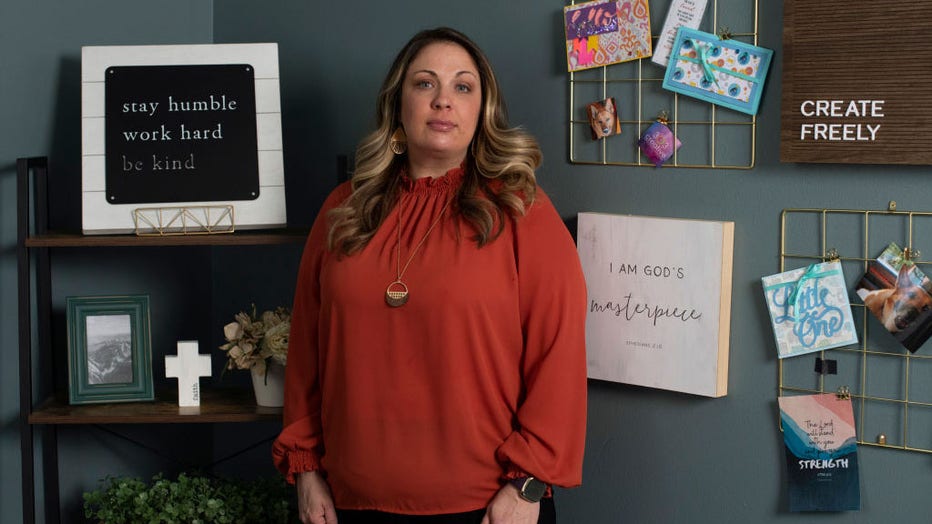Supreme Court justices spar in latest clash of religion and gay rights
Who are the Supreme Court justices?
Nine justices make up the Supreme Court. Here's a look at all nine justices who make up the U.S. Supreme Court, including the newest Associate Justice Ketanji Brown Jackson.
WASHINGTON - The Supreme Court's conservative majority sounded sympathetic Monday to a Christian graphic artist who objects to designing wedding websites for gay couples, a dispute that's the latest clash of religion and gay rights to land at the highest court.
The designer and her supporters say that ruling against her would force artists — from painters and photographers to writers and musicians — to do work that is against their beliefs. Her opponents, meanwhile, say that if she wins, a range of businesses will be able to discriminate, refusing to serve Black customers, Jewish or Muslim people, interracial or interfaith couples or immigrants, among others.
Over more than two hours of spirited arguments, the justices repeatedly tested out what ruling for the designer could mean, using detailed and sometimes colorful hypothetical scenarios. Those included a Black Santa asked to take a picture with a child dressed in a Ku Klux Klan outfit, a photographer asked to take pictures for the Jewish dating website JDate and also the marital infidelity website Ashley Madison, and a food business called "Grandma Helen's Protestant Provisions."
Justice Neil Gorsuch, one of three high court appointees of former President Donald Trump, described Lorie Smith, the website designer in the case, as "an individual who says she will sell and does sell to everyone, all manner of websites, (but) that she won’t sell a website that requires her to express a view about marriage that she finds offensive."
Where to draw the line for what a business might do without violating state anti-discrimination laws was a big question in Monday's arguments at the high court.
Justice Ketanji Brown Jackson asked whether a photography store in a shopping mall could refuse to take pictures of Black people on Santa's lap.
"Their policy is that only white children can be photographed with Santa in this way, because that’s how they view the scenes with Santa that they’re trying to depict," Jackson said.
Justice Sonia Sotomayor repeatedly pressed Kristen Waggoner, the lawyer for Smith, over other categories. "How about people who don’t believe in interracial marriage? Or about people who don’t believe that disabled people should get married? Where’s the line?" Sotomayor asked.
But Justice Samuel Alito, who seemed to favor Smith, asked whether it's "fair to equate opposition to same-sex marriage to opposition to interracial marriage?"
The case comes at a time when the court is dominated 6-3 by conservatives and follows a series of cases in which the justices have sided with religious plaintiffs. Across the street from the court, lawmakers in Congress are finalizing a landmark bill protecting same-sex marriage.
The bill, which also protects interracial marriage, steadily gained momentum following the high court's decision earlier this year to end constitutional protections for abortion. That decision to overturn the 1973 Roe v. Wade case prompted questions about whether the court — now that it is more conservative — might also overturn its 2015 decision declaring a nationwide right to same-sex marriage. Justice Clarence Thomas explicitly said that decision should also be reconsidered.
US Senate passes same-sex marriage bill, now heads to House for final vote
Once the House votes on the bill, it will head to President Joe Biden's desk for his signature.
The case being argued before the high court Monday involves Smith, a graphic artist and website designer in Colorado who wants to begin offering wedding websites. Smith says her Christian faith prevents her from creating websites celebrating same-sex marriages.

FILE - Lorie Smith, the owner of 303 Creative, poses at her studio in Littleton, Colorado, on Nov. 15, 2022. (Photo by Rachel Woolf for The Washington Post via Getty Images)
"Ms. Smith believes opposite-sex marriage honors scripture and same-sex marriage contradicts it," Waggoner told the justices.
But offering wedding websites to same-sex couples and refusing to design them for opposite sex couples could get Smith in trouble with state law. Colorado, like most other states, has what's called a public accommodation law that says if Smith offers wedding websites to the public, she must provide them to all customers. Businesses that violate the law can be fined, among other things.
Five years ago, the Supreme Court heard a different challenge involving Colorado's law and a baker, Jack Phillips, who objected to designing a wedding cake for a gay couple. That case ended with a limited decision and set up a return of the issue to the high court. Waggoner, of the Alliance Defending Freedom, also represented Phillips.
Like Phillips, Smith says her objection is not to working with gay people. She has had gay clients, her lawyer said. But she objects to creating messages supporting same-sex marriage, just as she wouldn't create a website for a couple who met while they both were married to other people and then divorced.
Smith says Colorado’s law violates her free speech rights. Her opponents, including the Biden administration, the American Civil Liberties Union and the NAACP Legal Defense & Educational Fund, disagree.
Twenty mostly liberal states, including California and New York, are supporting Colorado, while 20 other, mostly Republican,states, including Arizona, Indiana, Ohio and Tennessee, are supporting Smith.
The case is 303 Creative LLC v. Elenis, 21-476.

